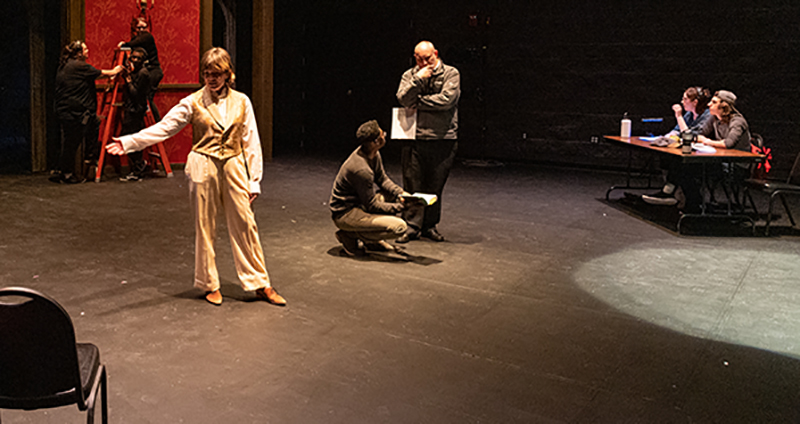Chaos and conundrums filled the stage as the cast and crew of the fictional play Delirious, within the actual play,10 out of 12, recreated the experience of the theater tech rehearsal, one of the most important rehearsals before opening night. The technical rehearsal is the very first time that lights, sound, acting, and other aspects of production, finally converge. It is full of opportunities, and yes, copious amounts of stress.
While Benjamin Gailey’s 10 out of 12 did not shy away from the troubles and tensions that plagued Delirious‘ tech rehearsal, but balances these moments with comedic bits. Among the many things that went wrong during the rehearsal, some of the highlights included the moment which involved two actors trying a scene in the dark. When Eva, an actor played by Erin Kaufman, almost stepped into the audience, the director, played by Ed Pierce, retorted “Night vision goggles for the actors?”
During the performance I enjoyed, my mind kept coming back to the lovely irony of how when things went in Delirious, it was the result of the actual cast of 10 out of 12 doing exactly what the play’s script needs them to do. The stage manager, played by Zoe Dunn, alongside the director, oversaw all the unfiltered actions and events which unfolded during the rehearsal. Dunn effectively conveyed a stage manager’s potential exhaustion and tested patience through body language and expressions, while still retaining that required sense of leadership expected of the role.
Lindsey Markel, delivered an especially memorable performance as Paula. Paula embodied a clear sense of professionalism that dictated what she did and how she interacted with the cast and crew of Delirious. For better and for worse, Markel portrayed the character’s complexities of Paula’s nature through a strong yet honest tone and presentation. This was especially evident when Paula criticized one of the other actors for arriving ten minutes late to a scene rehearsal, and when, in a later scene, she sparred with the director over the desires and nuances of her character. While audiences may have been taken aback by Paula’s forwardness, she later delivered a monologue that reveals her authentic passion for theatre and her previous experiences within similar rehearsals.
The structure of 10 out of 12 felt different from so many other plays. The scenes and their subsequent components almost functioned like puzzle pieces. Since there was no clear way of dividing the play into two halves, the play offered solution for intermission. After a moment of tension, the stage manager called for a fifteen-minute break for everyone, including members of the audience.
The puzzle-like feeling of the play continued with moments where multiple conversations and actions were taking place both onstage and offstage, echoing a sense of overload and busyness that can happen during the actual rehearsal. There was even a time when three competing focal points competed for the audience’s attention. As two actors rehearsed a slap scene under the watch of the director, there was a comical discussion between the assistant director and another actor which mentioned eating chips, while an unseen, background, tech-staff conversation, revealing reflections about the world, was heard through the speakers.

Photo by Bryan Heaton.
Looking back, there were two important pieces of dialogue which best spoke to one of 10 out of 12′s main messages. At one point, Paula exclaimed, “How will we live with ourselves if we don’t bring something good enough?” Ben, played by Mathew Green, responds, “There will always be a kind of failure. We have to find beauty in that.” The tenderness and truth told of the complex yet beautiful world that is theatre, and 10 out of 12 portrayed a behind-the-scenes look into the world’s captivating atmosphere—a combination of nerves, anticipation, and the perpetual potential for a wonderful performance filled with meaning and memories.
10 out of 12
February 17th-19th, 24th-26th, 7:30 p.m.
February 20th and 27th, 3 p.m.
Parkland College Theatre
Second Stage
2400 W Bradley Ave., Champaign








